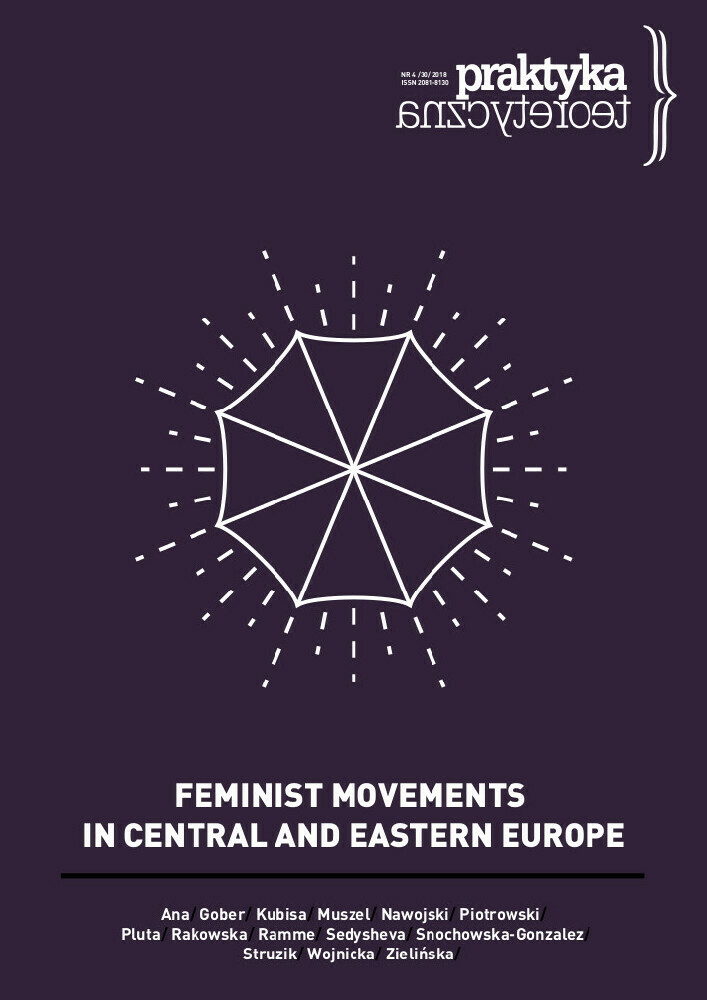Abstract
This paper discusses the #BlackProtest mobilization among Polish migrant women living in four European cities. The #BlackProtest is the name of the most impressive women’s rights protest in Poland’s recent history. The main research question explored in this small study was what the act of solidarity, demonstrated in organizing the #BlackProtest internationally, meant for its organizers. The analysis of the reasons behind the transnational #BlackProtest organizing revealed that it is insufficient to talk about #BlackProtest mobilization only in terms of transnational activism. The theoretical framework of the study needed to be expanded from social movements to contemporary diasporas and the discussion demonstrated how through a process of identities, heterogeneity and boundaries’ negotiations a feminist diaspora was formed. Social movements’ theories, explaining the role of connective leadership, discursive opportunity structures and emotions in social mobilization helped to demonstrate how this media-driven mobilization initiated the emergence of a transnational, feminist diaspora.References
Berns-McGown, Rima. 2007/2008. “Redefining »Diaspora«: The Challenge of Connection and Inclusion.” International Journal 63(1): 3–20.
Campt, Tina, and Deborah Thomas. 2008. “Gendering diaspora: transnational feminism, diaspora and its hegemonies.” Feminist Review 90(1): 1–8. https://doi.org/10.1057/fr.2008.41
Chmielewska, Marta, Małgorzata Druciarek, and Izabela Przybysz. 2017. Czarny Protest. W stronę nowego “kompromisu aborcyjnego”? Warszawa: Instytut Spraw Publicznych.
Cohen, Robin. 1997. Global Diasporas. An Introduction. London: UCL Press.
Della Ratta, Donatella, and Augusto Valeriani. 2014. “Remixing the Spring! Connective Leadership and Read-Write Practices in the 2011 Arab Uprisings.” In Communication Rights and Social Justice. Historical Accounts of Transnational Mobilizations. Eds. C. Padovani and A. Calabrese. London, UK: Palgrave Macmillan: 288–304.
Diani, Mario. 2013. “Bloc Recruitment.” In The Wiley-Blackwell Encyclopedia of Social and Political Movements. Eds. D.A. Snow, D. della Porta, B. Klandermans, D. McAdam. Oxford: Wiley-Blackwell.
Flam, Helena. 2005. “Emotion’s Map: a Research Agenda.” In Emotions and Social Movements. Routledge Advances in Sociology. Eds. H. Flam and D. King. London–New York: Routledge: 19–40.
Flick, Uwe. 2006. An Introduction to Qualitative Research. London. Thousand Oaks, California: Sage Publications.
Gober, Greta. 2016 a. “Polarization in Poland. Commentary.” Baltic Worlds 9(4): 88–89.
Gober, Greta. 2016 b. “International Ultra-Conservative Anti-Abortion Lobbying. Who is Behind the Anti-Abortion Bill in Poland.” Kvinnefronten October 7.
Gober, Greta. 2018. Instytucja medialna przez pryzmat płci. Gdańsk: Wydawnictwo Naukowe Katedra.
Hall, Stuart. 1994. “Cultural Identity and Diaspora.” In Colonial Discourse and Post-Colonial Theory. Eds. P. Williams and L. Chrisman. New York: Columbia University Press: 392–403.
Jasper, James. 1997. The Art of Moral Protest. Culture, Biography, and Creativity in Social Movements. Chicago: The University of Chicago Press.
Koopmans, Ruud. 2004. “Movements and Media: Selection Processes and Evolutionary Dynamics in the Public Sphere.” Theory and Society 33: 367–391.
Korolczuk, Elżbieta. 2016a. “Mass Mobilization Against the Ban on Abortion in Poland.” Baltic Worlds 9(4): 88–89.
Korolczuk, Elżbieta. 2016b. “Explaining Mass Protests Against Abortion Ban in Poland: the Power of Connective Action.” Zoon Politikon 7: 91–113.
Król, Agnieszka, and Paula Pustułka. 2018. “Women on Strike: Mobilizing Against Reproductive Injustice in Poland.” International Feminist Journal of Politics 20(3): 366–384. https://doi.org/10.1080/14616742.2018.1460214.
Kubisa, Julia. 2016. “Odzyskajmy Polskę dla kobiet!” Krytyka Polityczna October 10. Retrieved from: https://krytykapolityczna.pl/kraj/odzyskajmy-polske-dla-kobiet/ (accessed 20.04.2019).
Majewska, Ewa. 2016. “Słaby opór i siła bezsilnych. #CzarnyProtest w Polsce 2016.” Praktyka Teoretyczna November 10. Retrieved from:http://www.praktykateoretyczna.pl/ewa-majewska-slaby-opor-i-sila-bezsilnych-czarnyprotest-kobiet-w-polsce-2016/ (accessed 15.04.2019).
McAdam, Dough. 2015. “Recruits to Civil Rights Activism.” In The Social Movements Reader: Cases and Concepts. Eds. J. Goodwin & J.M. Jasper. Chichester, West Sussex, UK–Malden, MA: John Wiley & Sons Inc.: 65–75.
Morris, Aldon. D., and Suzanne Staggenborg. 2004. “Leadership in Social Movements.” In The Blackwell Companion to Social Movements. Eds. D. A. Snow, S. A. Soule and H. Kriesi. Oxford–Malden, MA: Blackwell.
Mosca, Lorenzo. 2014. “Bringing Communication Back In: Social Movements and Media.” In Communication Rights and Social Justice. Historical Accounts of Transnational Mobilizations. Eds. C. Padovani and A. Calabrese. London, UK: Palgrave Macmillan: 219–234.
Narkowicz, Kasia. 2016. “Czarny Protest: How Polish Women Took to the Streets.” Open Democracy October 11. Retrieved from: https://www.opendemocracy.net/en/can-europe-make-it/czarny-protest-how-polish-women-took-to-streets/ (accessed 20.04.2019).
Paerregaard, Karsten. 2010. “Interrogating Diaspora: Power and Conflict in Peruvian Migration.” In Diaspora and Transnationalism. Concepts, Theories and Methods. Eds. R. Bauböck and T. Faist. Amsterdam: Amsterdam University Press: 91–107.
Sawyer, Lena. 2008. “Engendering »Race« in Calls for Diasporic Community in Sweden.” Feminist Review 90: 87–105.
Sökefeld, Martin. 2006. “Mobilizing in Transnational Spaces: a Social Movement Approach to the Formation of Diaspora.” Global Networks 6(3): 265–284.
Walgrave, Stefaan, and Jan Manssens. 2000. “The Making of the White March: The Mass Media as a Mobilizing Alternative to Movement Organizations.” Mobilization 5(2): 217–239.
License
“Theoretical Practice” seeks to put into practice the idea of open access to knowledge and broadening the domain of the commons. It serves the development of science, thinking and critical reflection. The journal is published in open-access mode under the CC-BY-NC-SA 4.0 license (detail available here: http://creativecommons.org/licenses/by-nc-sa/4.0/). Articles published in the journal may be freely distributed, stored, printed and utilized for academic and teaching purposes without restrictions.
They should not be, however, used for any commercial purposes or be reconstructed into derivative creations. Access to the journal may not be limited or offered for a fee by any third party.
Prospective authors are obliged to fill in, sign and send back the publishing contract compliant with the CC licencing. [PL.pdf, PL.doc, EN.pdf,EN.doc].
According to this contract, authors grant the journal a non-exclusive right to publish their work under the creative commons license (CC-BY-NC-SA 4.0) without any financial obligation on both sides of the contract.
Before submission authors should make sure that derivative materials they use are not protected by copyright preventing their non-commercial publication. Authors are responsible for any respective copyright violations.
